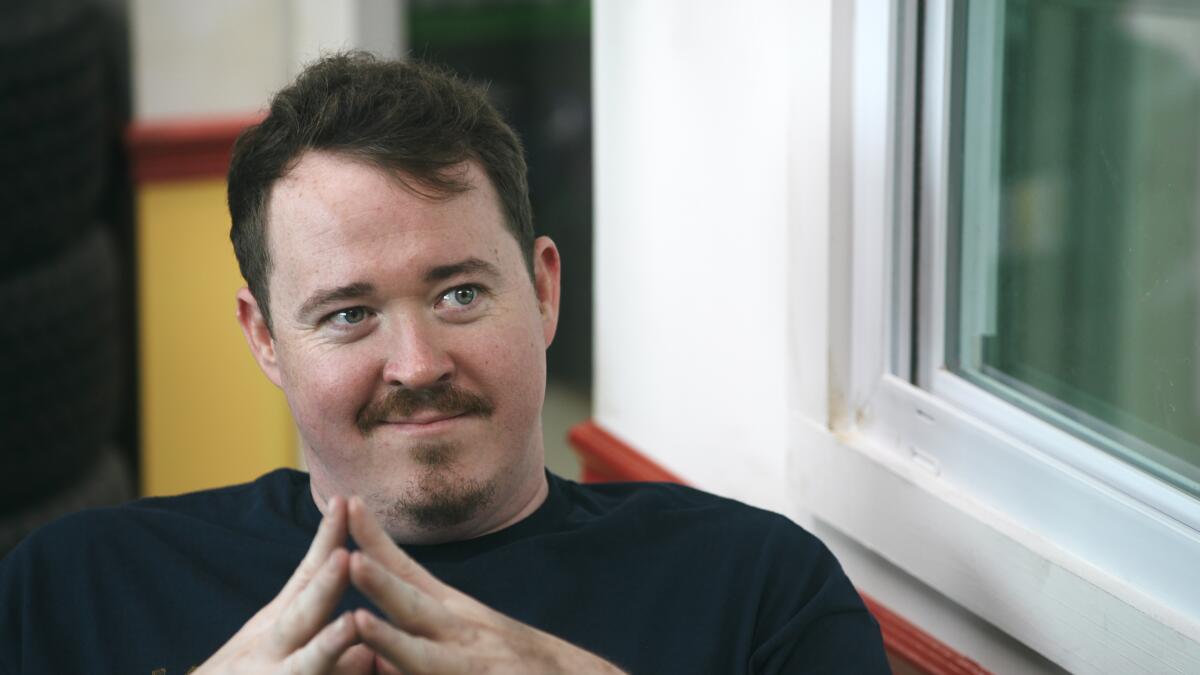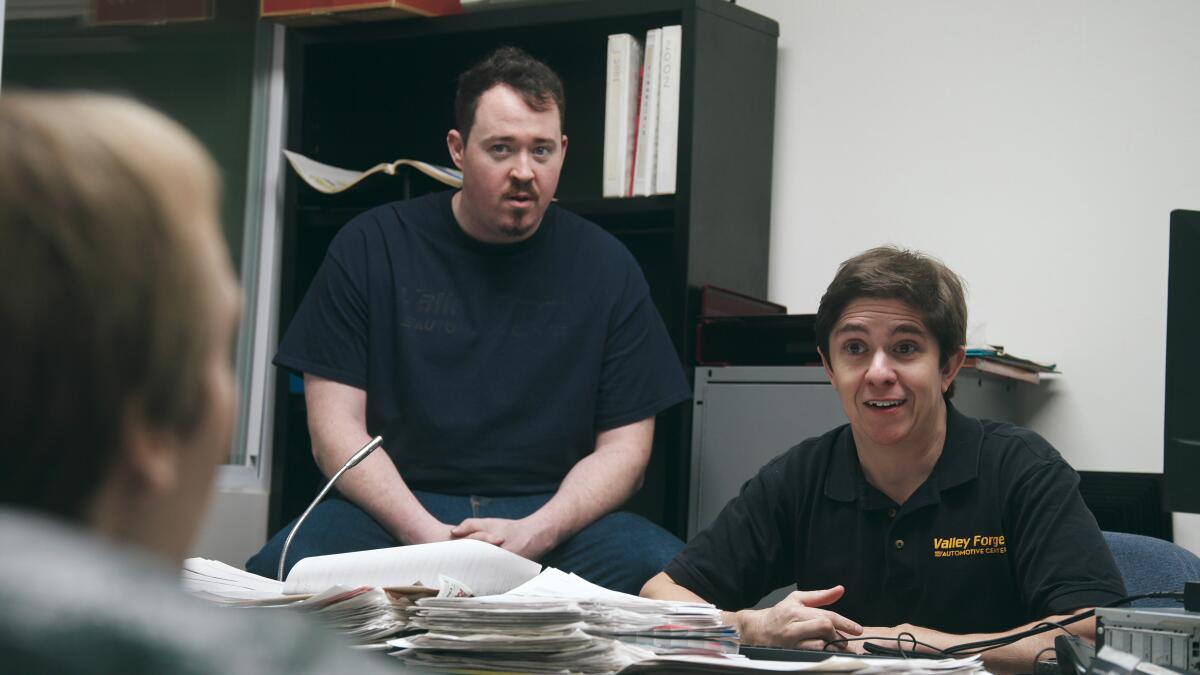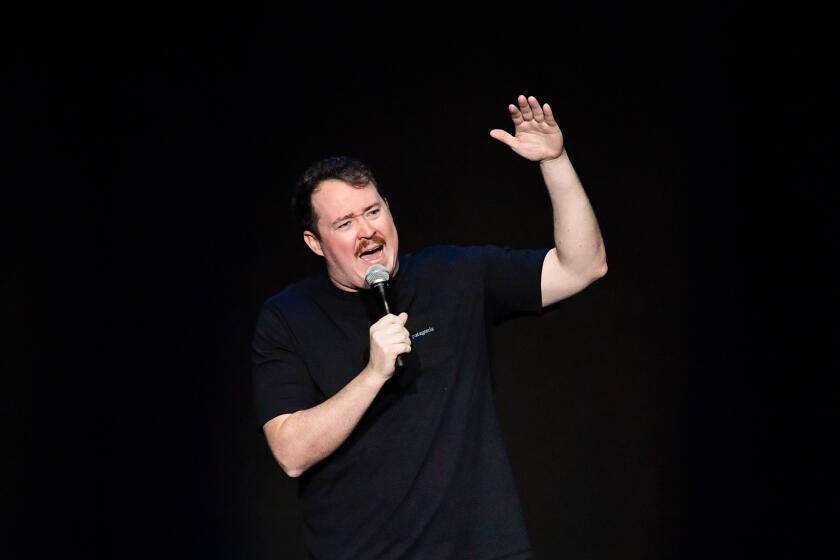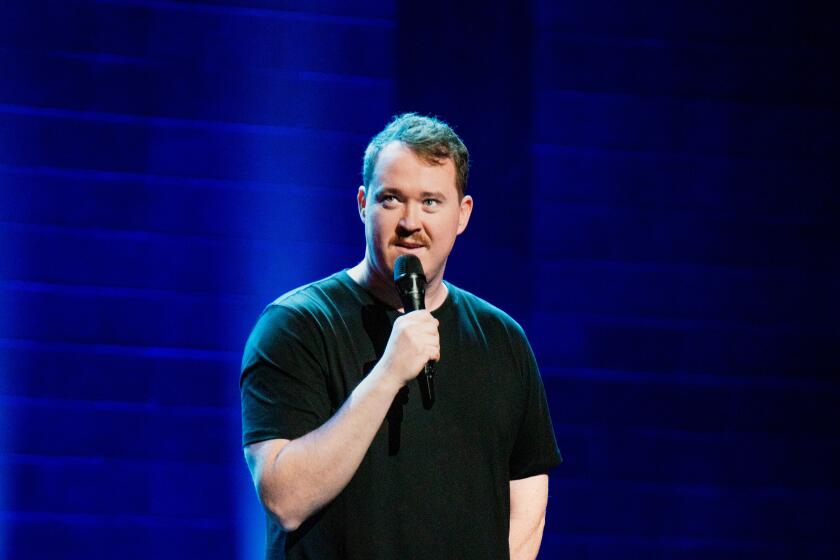Review: In Shane Gillis’ Netflix show ‘Tires,’ the humor doesn’t veer far from juvenile

- Share via
I know that Shane Gillis is a controversial comic — not in the Lenny Bruce sense, but because in 2019 he was cast on “Saturday Night Live” as a featured player and fired from the show, even before his first appearance, when remarks surfaced that I’ve seen characterized as “racist, homophobic and misogynist.” I don’t know what those remarks were or in what context they were offered, but my guess is that they were supposed to be funny. And this February he returned to the show as a guest host.
Gillis is now the star and co-creator (with Steve Gerben, who co-stars, and McKeever, who directs) of “Tires,” a six-episode Netflix comedy that has already been renewed for a second season. Given that 1) Gillis is popular, if not popular with everyone — unpopular performers don’t host “SNL”; 2) this is a relatively cheap show, shot almost entirely on a single location; and 3) Netflix, in its drive to destroy the rest of television, wants to capture every possible audience, this isn’t particularly surprising.
Shane Gillis is hosting “Saturday Night Live” after being fired in 2019, when his bigoted remarks surfaced. Has he evolved since or is he simply toning down his language?
The comedian already has a Netflix stand-up special, last year’s “Beautiful Dogs,” which I haven’t watched. As in a courtroom where certain evidence may be excluded as prejudicial, it seemed fair to treat “Tires” blind, on its own merits, or lack of same.
It’s a slight show, set in an auto repair shop, incompetently managed by Will (Gerben), one of several owned by his father. Gillis plays Shane, his cousin, an employee whose day is almost entirely devoted to teasing, humiliating and undermining Will. As we begin, Will has mistakenly ordered 500 tires, which he tries to mitigate by noting that he got a volume discount. Sending them back does not seem an option.

Also working at the garage are Kilah (Kilah Fox), a receptionist, I guess, whose job seems to be smoking cigarettes and looking annoyed, and Cal (Chris O’Connor), the only one of them who might be employable elsewhere. Stavros Halkias plays the district manager, who is frequently on-site or on the phone; he is a large, long-haired, unkempt thorn in their side.
Business is down, if it was ever up — the possibility of someone losing their position or the shop itself being shut down runs through the season. They are bad at upselling customers, apparently the backbone of the auto repair business, but one wonders how they have any customers to upsell to at all, their service being worse than nonexistent. Certainly you would not take your car there more than once.
Either to represent the brand, or to prove that there is a place in the streaming universe for “offensive” humor, Gillis and company dutifully push some buttons. (The Netflix guide describes “Tires” as “deadpan” and “raunchy.”) We get, among other things, “gay” as a pejorative, Shane putting on a bad Japanese accent, the word “pussy” in two senses (neither having anything to do with cats), an Italian slur, a joke about Jewish noses, much talk of breasts and bottoms (not the terms employed here) and a lot of sex jokes. (I was going to write “crude sex jokes,” but that felt redundant.) As if to balance this, nearly every woman in the series — customers, most of them — is smarter than the men. (Cal, who would just like to get on with his work, excepted.)
Comedian Shane Gillis quickly addressed his firing in his monologue on ‘Saturday Night Live,’ and then proceeded to walk a comedic tightrope.
One might say that these are characters and do not represent the personal predilections of the writers and actors, or that there are people like this in the world — presumably some are fans of Gillis’ comedy — and so the creators are just being, you know, honest. Some of them are clearly idiots. I’m pretty sure we’re supposed to regard Shane as a charming, even admirable fellow, self-possessed, in control of a situation (if to no positive effect) in a way that Will, a classic schlemiel, is not. And yet Gillis’ best moments are when he stops being a jerk for a moment and becomes actually helpful or thoughtful; he has a surprising softness. As a screen presence, he’s not unappealing.
The quandary of what constitutes a joke and how to take it is of course at heart of much professional — and political — discourse these days, and people are always telling other people that they just don’t get it, or they’re being too sensitive or not sensitive enough. I wasn’t outraged — the humor, like the characters, is too pointedly juvenile to take that seriously. Still, I didn’t laugh once. Humor is funny that way.
The season has a happy ending. It has to do with those tires.
More to Read
The complete guide to home viewing
Get Screen Gab for everything about the TV shows and streaming movies everyone’s talking about.
You may occasionally receive promotional content from the Los Angeles Times.









